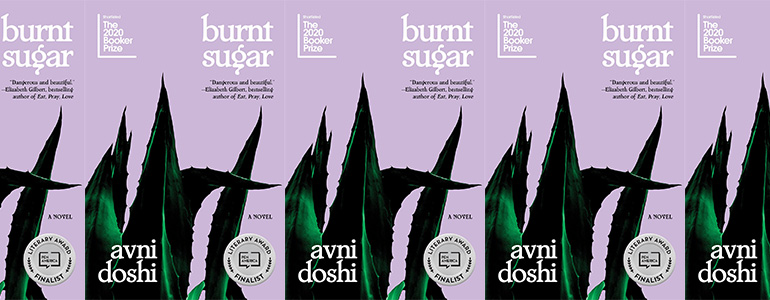The Parasitism of Memory in Burnt Sugar

When an insect is taken over by a parasite, its mind succumbs to its new captor. No longer in control of itself, it defaults to whatever the parasite wants. Usually this means forgoing its own instincts for this other, freeloading thing. Memory is like this too. We default to our own minds to remind us of what happened in our pasts, but sometimes (all the time?) what we remember and what others remember are vastly different. If our minds can distort our memories into unrecognizable things and still have us believe them as truth, is it apt to say they overtake us, a sort of parasitic recall designed to humor us through our lives?
Avni Doshi, author of the Booker shortlisted Burnt Sugar (2019), wonders this as well. Her book tells the story of a mother and daughter tied together through birth and through time, and who have a relationship that is deeply fraught with tension. The mother, Tara, has begun to lose her memory, and her daughter, Antara, has been desperately trying to help her salvage her past. Between countless trips to the doctor—a man who assures her there is nothing visibly wrong with her mother’s brain despite all evidence to the contrary—and her own attempts to restore her mother’s fading mind, Antara struggles with having to relive their shared memories together, memories full of maternal betrayal and complicated love.
There are memories I share with my mother that we do not agree on. For example, there is the one of my pet parakeet, who I adamantly believe we allowed to fly freely around the house, even when we were not home. My mother does not agree, says she would never have allowed such a crazy thing to happen. Still, I see images of this memory in my mind’s eye. I see us saying goodbye to that little, yellow bird as she sits on top of her open cage and watches us walk out the door. This memory cannot be altered for me, but it also cannot be altered for my mother. We remember different things and each of us believes that we are right. Much like Antara and her mother, when this memory is brought up, we struggle to comprehend how each of us could recall such drastically different depictions of a shared time in our lives. “Reality is something that is co-authored,” a life coach tells Antara, and I wonder if the truth of our shared memory lies somewhere in between the both of us.
The mother and daughter of Burnt Sugar are, like many mothers and daughters, inexplicably tied to one another through their womanness. Antara has lived with her mother her entire life. When her mother made the decision to leave Antara’s father to go live in an ashram, Antara came with her. She watched as her mother fell deeply in love with the ashram’s guru, choosing his affection over providing her daughter with some of her own. And when her mother’s relationship eventually ended, it was Antara who accompanied her mother out of the ashram and on to the next phase and the next man in her mother’s life. Both Tara and Antara experienced the same moments in time, but their memories of that time in their lives could not be more different. They are, in a way, each infected with a different parasitic recollection, so that now, as she watches her mother struggle to remember even the simplest of things, Antara struggles with navigating their shared past together. “I have a suspicion that my mother is leaking,” she tells the doctor, as if her mother is a glass jar with a small crack somewhere in the lid.
When we think of memory, we tend to believe in it fully. We trust it to guide us in our choices, hoping that it can somehow teach us something about how to live our lives. After all, it is truly the only thing we have of the past to potentially protect and guide us through our futures. We are, much like a host, slaves to it, changing our present actions to suit what we have learned and stored from our memories. Only when we stop to examine our memories closely do we realize that they are filled with thousands of tiny fissures. They exist in our minds like unstable pottery. From afar, they look held together with confidence, but upon closer inspection, you begin to notice all of the cracks.
Outside of Antara’s relationship with her mother, she is an artist. Her mother does not fully approve of her chosen career path, and the one major work Antara is most well-known for involves relying on her memory to create it. She tells everyone that she drew a portrait of a man from a random photograph she found, but when she went back to complete the drawing the next day, the photograph was gone. She decided to try to continue the project anyway, choosing to draw a new image of the man based on the drawing from the day before. Relying on only her memory of the original image, she has been creating drawing after drawing of the same man for years. Like a game of telephone with the self, her images are displayed side by side, their differences only visible once viewed together all at once.
This exercise in memory is interesting, a way to catalog the passing of time and how one’s mind is always altering it. But it becomes even more interesting once we find out that the man in the drawings is actually a lover that Antara and her mother each shared at different points in their lives. Antara’s mother was the first to fall in love with him, but many years later, after that relationship ended, Antara and the man unexpectedly met and fell in love. It is a secret that only she and her mother hold, both women the only people truly in the know about who the man in the drawings is.
If we think about parasites and memory as a type of parasite, we can think about how this one single person has been able to make a home for himself in these two women’s minds. There are some things they recall about him that are the same, but they have other, separate instances of recollection that alter and sway their experiences of him, distorting their perspective, changing the way they can agree or not agree on what would otherwise be a shared understanding. Maybe the parasitism is not just the fault of memory, then, but also encouraged by the relationships those memories are tied to.
During a checkup, Tara’s doctor tells Antara that she and her mother “have always shared some version of [their] objective reality.” He tells her that “memory is a work in progress. It’s always being reconstructed.” This idea of sharing an “objective reality” suggests that both Antara and Tara are one and the same, despite living in separate bodies. Their minds overlap in ways others do not, and what they recall together can be representative of their shared history. Still, these shared experiences of the past can be dissonant with one another, leaving them no way of knowing what the truth really is. “I will lose her in increments,” thinks Antara as she contemplates her mother’s fading mind. “At the end, she will be a house I’ve moved out of, containing nothing that is familiar.” A parasite vacating the body of its host.
By the time this piece is published, I will, hopefully, soon be giving birth to a baby boy. Barring any complications in the final months before his delivery, I will have harbored his tiny body within my own for 40 weeks. At first, even though I was aware of his presence in my body—my doctor confirmed it via ultrasound—I was not physically aware of him in any tangible way. To me, he was still an idea burrowed somewhere deep inside myself, too small to physically recognize. But as he grew, he began to make his presence known. Slowly, his tiny hands and feet started pushing up against my insides, little knocks on a door that was not quite ready to open. When he first started to move with significance, it was startling. It was startling to look down and see my stomach bulge and distend without my consent, and as comforting as it is to feel a baby move inside your own body, there is also something alien to it. If you think about it too long, you begin to feel like a host harboring a parasitic egg that will burst forth from your stomach at any moment. In some ways, I guess, this is not that far from the truth.
Don’t get me wrong. Pregnancy is a beautiful thing. But in the context of a body making room for another living organism to grow and feed off its host, it’s easy to see how it can also be seen as deeply parasitic. Towards the end of Burnt Sugar, Antara becomes pregnant with a baby girl. She worries about her relationship to her unborn child and wonders whether she will affect this child in the same ways her mother affected her. “On my lap, I can see the mound that is my stomach moving. It already doesn’t belong to me, this creature. It already has a mind of its own,” she thinks, drawing a line between its life and hers. And yet, her baby is a part of her, linked to her body through blood but also, eventually, through mind. They will share a life together, their memories intertwining to create their own complex reality.
During a get together with friends, one of Antara’s guests talks about parasites. He describes a fungus that takes over the body of a caterpillar in order to proliferate. He is impressed by the fungus’s vigor and believes that its ability to overtake something and grow could be useful to science. “Parasites could be the greatest weapon on Earth,” he says. “Genetically modify them and they could turn their hosts into zombies.” Of course, what this friend doesn’t realize and what Doshi seems to be suggesting is that this concept of parasitism in humans may already be occurring. A mother gives birth to a child, and that child goes on to build a life for itself. They are bound to each other through birth and through their early years living alongside one another, but eventually there must be a departure. Both must go their separate ways, taking their shared memories in different directions. But the question of who in this relationship can be seen as the parasite and who is the host remains.
Reflecting on her childhood, Antara says, “I wonder did she ever see me as a child she wanted to protect? Did she always see me as a competitor or, rather, an enemy?” She remembers the hatred she had for her own mother during her youth, how badly she “wished [her mother] had never been born.” But a child without a mother is not possible, just like a parasite without a host cannot survive. “I understood how deeply connected we were, and how her destruction would irrevocably lead to my own,” Antara thinks, the memories of her childhood bewildering her mind.
This piece was originally published on April 20, 2022.


